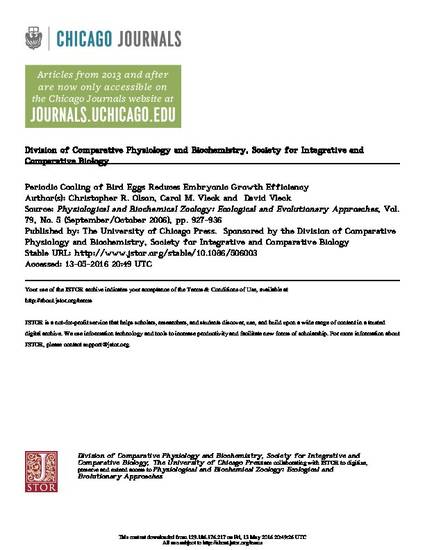
Article
Periodic Cooling of Bird Eggs Reduces Embryonic Growth Efficiency
Physiological and Biochemical Zoology
Document Type
Article
Disciplines
Publication Version
Published Version
Publication Date
9-1-2006
DOI
10.1086/506003
Abstract
For many bird embryos, periodic cooling occurs when the incubating adult leaves the nest to forage, but the effects of periodic cooling on embryo growth, yolk use, and metabolism are poorly known. To address this question, we conducted incubation experiments on eggs of zebra finches (Taeniopygia guttata) that were frequently cooled and then rewarmed or were allowed to develop at a constant temperature. After 12 d of incubation, embryo mass and yolk reserves were less in eggs that experienced periodic cooling than in controls incubated constantly at 37.5C. Embryos that regularly cooled to 20C had higher mass-specific metabolic rates than embryos incubated constantly at 37.5C. Periodic cooling delayed development and increased metabolic costs, reducing the efficiency with which egg nutrients were converted into embryo tissue. Avian embryos can tolerate periodic cooling, possibly by adjusting their physiology to variable thermal conditions, but at a cost to growth efficiency as well as rate of development. This reduction in embryo growth efficiency adds a new dimension to the fitness consequences of variation in adult nest attentiveness.
Copyright Owner
The University of Chicago
Copyright Date
2006
Language
en
File Format
application/pdf
Citation Information
Christopher R. Olson, Carol M. Vleck and David Vleck. "Periodic Cooling of Bird Eggs Reduces Embryonic Growth Efficiency" Physiological and Biochemical Zoology Vol. 79 Iss. 5 (2006) p. 927 - 936 Available at: http://works.bepress.com/carol-vleck/11/

This article is from Physiological and Biochemical Zoology 79 (2006); 927, doi: 10.1086/506003. Posted with permission.